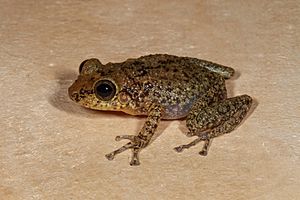Eleutherodactylus flavescens facts for kids
Quick facts for kids Eleutherodactylus flavescens |
|
|---|---|
 |
|
| Conservation status | |
| Scientific classification |
|
| Kingdom: | Animalia |
| Phylum: | Chordata |
| Class: | Amphibia |
| Order: | Anura |
| Family: | Eleutherodactylidae |
| Genus: | Eleutherodactylus |
| Species: |
E. flavescens
|
| Binomial name | |
| Eleutherodactylus flavescens Noble, 1923
|
|
| Script error: The function "autoWithCaption" does not exist. | |
Script error: No such module "Check for conflicting parameters".
The Eleutherodactylus flavescens is a small frog that lives only in the eastern part of the Dominican Republic. This means it is endemic to that area, found nowhere else in the world! It belongs to a group of frogs called Eleutherodactylidae. These frogs are sometimes called "rain frogs" or "direct-developing frogs" because their eggs hatch directly into tiny froglets, without a tadpole stage.
Contents
About the Golden Frog
The Eleutherodactylus flavescens is often called the "golden frog" because of its yellowish color. It was first described by a scientist named Gladwyn Kingsley Noble in 1923. This frog is an important part of the natural world in the Dominican Republic. It helps keep insect populations in check.
Where the Golden Frog Lives
This special frog mostly lives in mesic forests. A mesic forest is a type of forest that gets a good amount of rainfall, so it's not too dry or too wet. Sometimes, you can also find these frogs in mangrove areas. Mangroves are unique forests that grow in salty water along coastlines.
The golden frog likes places where there is plenty of moisture and shelter. It often hides among leaves on the forest floor. This helps it stay safe from predators.
What's Happening to the Golden Frog
Even though the golden frog used to be very common in its preferred homes, its numbers have started to drop in some areas. The biggest problem for this frog is habitat loss. This means the places where it lives are disappearing.
People are building more roads, hotels, and other things for tourism. This construction takes away the forests where the frogs live. Also, land is being cleared for farming, which is called "agricultural encroachment." Both of these activities destroy the frog's natural home.
Why We Should Protect It
Protecting the Eleutherodactylus flavescens is important for several reasons. Every animal plays a role in its ecosystem. Frogs, like this one, are good indicators of a healthy environment. If frog populations are declining, it often means there are problems with the habitat.
Saving the golden frog means saving its forest home. This also helps many other plants and animals that live in the same place. It's like protecting a whole neighborhood, not just one house.
See also
 In Spanish: Eleutherodactylus flavescens para niños
In Spanish: Eleutherodactylus flavescens para niños
 | Percy Lavon Julian |
 | Katherine Johnson |
 | George Washington Carver |
 | Annie Easley |


